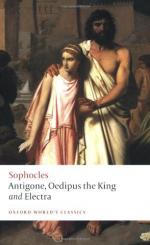|
This section contains 1,042 words (approx. 3 pages at 400 words per page) |

|
Since the time of their first production in the fifth century B.C., scholars and critics have contended that the tragedies of Sophocles represent Greek drama in its purest and most highly-attained form. Aristotle used elements of Sophoclean tragedy as the main concepts of his general theory of drama in the Poetics According to Aristotle, a tragedy is most successful when the moments of recognition (what he termed anagnorisis) and reversal (peripeteia) occur at the same time. Aristotle claims that a tragedy is not merely the imitation of an individual but of a life. By this he means that an individual's actions are more important to the development of the play than the particulars of his or her character.
Aristotle criticizes plays which include lengthy speeches solely for the purpose of expressing character and praises those works which sacrifice such elements in favor of a meaningful...
|
This section contains 1,042 words (approx. 3 pages at 400 words per page) |

|




